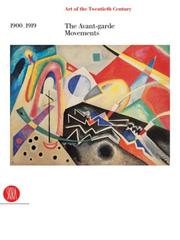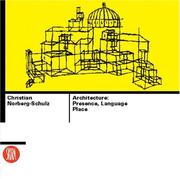| Listing 1 - 4 of 4 |
Sort by
|

ISBN: 8876246045 9788876246043 Year: 2006 Publisher: Milano : Skira,
Abstract | Keywords | Export | Availability | Bookmark
 Loading...
Loading...Choose an application
- Reference Manager
- EndNote
- RefWorks (Direct export to RefWorks)
Der Blaue Reiter --- avant-garde --- Die Blaue Vier --- Expressionist [style] --- Modernist --- History --- Futurist --- De Stijl --- Die Brücke --- Iconography --- Art --- art history --- Suprematist --- art [fine art] --- Cubist --- Art styles --- Fauve --- Art Nouveau --- Dada --- motion pictures [visual works] --- metaphysics --- anno 1910-1919 --- anno 1930-1939 --- anno 1900-1909 --- anno 1900-1999 --- anno 1800-1899 --- anno 1920-1929 --- Art, Modern --- kunst --- naslagwerk --- kunstgeschiedenis --- twintigste eeuw --- schilderkunst --- fauvisme --- kubisme --- art nouveau --- expressionisme --- futurisme --- kunst en film --- suprematisme --- abstractie --- abstracte schilderkunst --- dada --- dadaïsme --- 7.03 --- 7.036.1 --- 7.036 --- Moderne kunststijlen --- 7.036 Moderne kunststijlen --- modernisme --- 1900 - 1919 --- 20ste eeuw --- Affichistes (Group of artists) --- Fluxus (Group of artists) --- Modernism (Art) --- Schule der Neuen Prächtigkeit (Group of artists) --- Zero (Group of artists) --- avant-garde. --- modernisme. --- 1900 - 1919. --- 20ste eeuw. --- art [discipline] --- tentoonstelling Gent (1848). --- 19de eeuw.
Book
ISBN: 1282639447 9786612639449 1400835038 9781400835034 9780691124148 0691124140 9781282639447 9780691154497 069115449X Year: 2010 Publisher: Princeton : Princeton University Press,
Abstract | Keywords | Export | Availability | Bookmark
 Loading...
Loading...Choose an application
- Reference Manager
- EndNote
- RefWorks (Direct export to RefWorks)
To many readers of The Prince, Machiavelli appears to be deeply un-Christian or even anti-Christian, a cynic who thinks rulers should use religion only to keep their subjects in check. But in Machiavelli's God, Maurizio Viroli, one of the world's leading authorities on Machiavelli, argues that Machiavelli, far from opposing Christianity, thought it was crucial to republican social and political renewal--but that first it needed to be renewed itself. And without understanding this, Viroli contends, it is impossible to comprehend Machiavelli's thought. Viroli places Machiavelli in the context of Florence's republican Christianity, which was founded on the idea that the true Christian is a citizen who serves the common good. In this tradition, God participates in human affairs, supports and rewards those who govern justly, and desires men to make the earthly city similar to the divine one. Building on this tradition, Machiavelli advocated a religion of virtue, and he believed that, without this faith, free republics could not be established, defend themselves against corruption, or survive. Viroli makes a powerful case that Machiavelli, far from being a pagan or atheist, was a prophet of a true religion of liberty, a way of moral and political living that would rediscover and pursue charity and justice. The translation of this work has been funded by SEPS - Segretariato Europeo per le Pubblicazioni Scientifiche.
Religion and politics. --- Political ethics --- Political science --- Politics, Practical --- Politics and religion --- Religion --- Religions --- Ethics, Political --- Ethics in government --- Government ethics --- Ethics --- Civics --- Religious aspects --- Political aspects --- Moral and ethical aspects --- Machiavelli, Niccolò, --- マキアヴェルリ --- Machiavelli, Niccolo,
Book
ISBN: 1283267470 9786613267474 1400840279 9781400840274 9780691151823 0691151822 9781283267472 6613267473 Year: 2011 Publisher: Princeton, NJ
Abstract | Keywords | Export | Availability | Bookmark
 Loading...
Loading...Choose an application
- Reference Manager
- EndNote
- RefWorks (Direct export to RefWorks)
Italy is a country of free political institutions, yet it has become a nation of servile courtesans, with Silvio Berlusconi as their prince. This is the controversial argument that Italian political philosopher and noted Machiavelli biographer Maurizio Viroli puts forward in The Liberty of Servants. Drawing upon the classical republican conception of liberty, Viroli shows that a people can be unfree even though they are not oppressed. This condition of unfreedom arises as a consequence of being subject to the arbitrary or enormous power of men like Berlusconi, who presides over Italy with his control of government and the media, immense wealth, and infamous lack of self-restraint. Challenging our most cherished notions about liberty, Viroli argues that even if a power like Berlusconi's has been established in the most legitimate manner and people are not denied their basic rights, the mere existence of such power makes those subject to it unfree. Most Italians, following the lead of their elites, lack the minimal moral qualities of free people, such as respect for the Constitution, the willingness to obey laws, and the readiness to discharge civic duties. As Viroli demonstrates, they exhibit instead the characteristics of servility, including flattery, blind devotion to powerful men, an inclination to lie, obsession with appearances, imitation, buffoonery, acquiescence, and docility. Accompanying these traits is a marked arrogance that is apparent among not only politicians but also ordinary citizens.
Liberty --- Political ethics --- Social ethics --- Political corruption --- Civil liberty --- Emancipation --- Freedom --- Liberation --- Personal liberty --- Democracy --- Natural law --- Political science --- Equality --- Libertarianism --- Social control --- Ethics, Political --- Ethics in government --- Government ethics --- Politics, Practical --- Ethics --- Civics --- Social problems --- Sociology --- Moral and ethical aspects --- Berlusconi, Silvio, --- Italy --- Politics and government --- Berluskoni, Silvio, --- Берлускони, Силвио, --- Italian history. --- Italian mores. --- Italy. --- Silvio Berlusconi. --- arbitrary power. --- arrogance. --- blind devotion. --- citizens. --- court system. --- court. --- cynicism. --- dependency. --- domination. --- fear. --- indifference. --- liberty. --- political liberty. --- powerful men. --- republican liberty. --- safety. --- security. --- self-respect. --- servants. --- servility. --- servitude. --- signore. --- subjects. --- superior power. --- unfreedom.

ISBN: 8881187000 9788881187003 Year: 2000 Publisher: Milan : Skira,
Abstract | Keywords | Export | Availability | Bookmark
 Loading...
Loading...Choose an application
- Reference Manager
- EndNote
- RefWorks (Direct export to RefWorks)
Through an original reflection on the history of architecture and modern building practices Norberg-Schulz analyses man's capacity to perceive, experience and inhabit space. From this theoretical standpoint he seeks to establish a link between modern architecture and reality as a source of inspiration. The volume is a valid instrument that permits the reader to interpret and compare modes considered central to modern design: the relationship between man and space (presence), design and its instruments (language) and architecture in its relationship to the landscape (place). Numerous examples of modern and ancient architecture and urban and landscape systems (Paris, Urbino, Jerusalem) strengthen and exemplify the theoretical notions, further supplementing them with a rich collection of images.
Architecture --- History --- Philosophy --- Histoire --- Philosophie --- Esthétique --- 72.01 --- 72.03 --- 72.036 --- Architectuurbeschouwing --- Architectuurtheorie ; architectuurfilosofie ; Chr. Norberg-Schulz --- Architectuur ; typologie ; morfologie ; topologie --- Architectuur (esthetica) --- Architectuurgeschiedenis --- Architectuur (geschiedenis) --- Architectuurtheorie --- Architectuur (theorie) --- Architectuuresthetica --- Twintigste eeuw (architectuur) --- 20ste eeuw (architectuur) --- Architectuur ; theorie, filosofie, esthetica --- Architecture. --- Esthétique. --- Esthétique
| Listing 1 - 4 of 4 |
Sort by
|

 Search
Search Feedback
Feedback About UniCat
About UniCat  Help
Help News
News